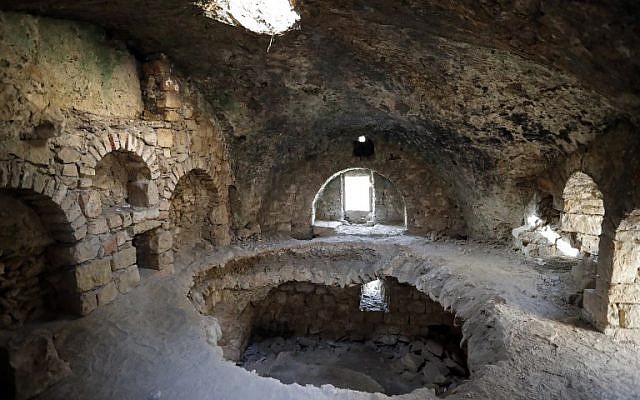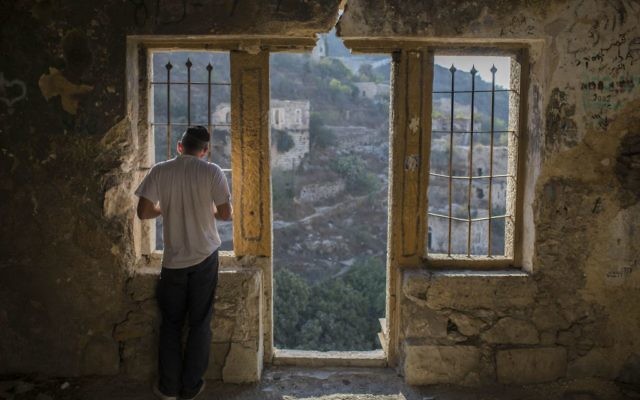Plan shelved to turn historic Arab village at Jerusalem entrance into luxury housing
 Saturday, August 20, 2022 at 03:28PM
Saturday, August 20, 2022 at 03:28PM Moshe Lion wants to preserve the village and turn it into a World Heritage Site.
by Sue Surkes 16 August 2022 Times of Israel
The Jerusalem Municipality and Israel Lands Authority have agreed to shelve and “rethink” plans to turn the picturesque former ( Palestinian' Ed.) Arab village of Lifta, located close to the western exit from the capital, into a boutique neighborhood for the rich.
Mayor Moshe Lion wants to preserve the village and turn it into a World Heritage Site.
Lifta is already on the list of UNESCO’s tentative World Heritage Sites for bearing “unique testimony of the traditional village life.
Unlike hundreds of other (Palestinian. Ed) villages that were abandoned only to be bulldozed and subsequently built over after the war, Lifta has remained virtually untouched, as if frozen in time.
Some 75 stone homes are dotted through the area, many of them remarkably preserved, even if their roofs have caved in.
A spring-fed pool is especially popular with Jerusalemites during the summer.
The descendants of the original (Palestinian, Ed) villagers, the Liftawis, return annually to declare to themselves and the world that one day they will return.

The Israel Lands Authority and the Jerusalem Municipality under its previous mayor, Nir Barkat, now a Likud Knesset member, wanted to develop Lifta by building luxury housing, a hotel, and an upscale commercial and business center there.
A Coalition to Save Lifta was formed to oppose the plans, uniting such diverse bedfellows as former residents and their descendants, Israeli academics, architects, members of the Society for the Protection of Nature, and recently-expelled Jewish residents of Lifta, who were settled there by the Jewish Agency in the 1950s but never received property rights.
Construction was slated to begin years ago. Then in 2012, the coalition succeeded in convincing a court to revoke the tender for building and order the Israel Antiquities Authority to conduct a thorough survey of the village, at the Israel Lands Authority’s expense. That survey was completed in December 2016.

The archaeologists found evidence of settlement in the site dating back thousands of years to the First Temple period, and were able, with the help of Arab former residents, to completely map out the evolution of the current village from a crusader farmhouse to a warren of connected buildings perched on the hills overlooking the valley.
Lifta, it emerged, was once the Jerusalem region’s biggest and most important Arab village.
Avi Mashiach, the conservation architect who led the survey, told The Times of Israel in 2017 that the survey showed “a full view of the culture and traditional life that has been preserved in an incredibly rare condition. There is no other village that has been preserved like this.”
“The best thing to do is to preserve and take advantage of the place for some kind of tourism or commerce, as is done around the world,” he added.
But the city continued to back the plan for housing at the site, which it said, at the time, would be revised to take the results of the archaeological survey into account. Mashiach and the coalition of opposition activists argued that no amount of careful planning could do justice to Lifta.
Around a year ago, the ILA again published a tender for developers interested in building at Lifta.
But after visiting the site, Moshe Lion decided to oppose the plan.
Earlier this year, he told the Calcalist business daily that the village should be preserved as a tourist site.

He also expressed concern that luxury development would create a ghost town because those able to afford the homes would only come for short periods each year.
“Lifta is one of the unique and beloved areas for the residents of Jerusalem,” a municipal statement said, “a village that dates back to the days of the Second Temple and continued to exist in various ways until the War of Independence.

“It serves as an important heritage symbol for Jerusalemites, Israelis and all those who come to Jerusalem. In the past, a plan to build housing units on the site was approved. The mayor discovered that this plan does not consider the preservation needs to the proper degree and in his opinion, is not appropriate at all. Therefore, in coordination with the ILA, it was decided not to market [the project] and to have a rethink.
“At the heart of the new thinking is the preservation of Lifta and its transformation into a world heritage site.”
The statement said that the city would soon hold roundtable discussions with a broad array of parties to decide how best to preserve and promote the village.
Times of Israel staff contributed to this report.
Editor's Note: The original article does not mention the word 'Palestinian' (they have been added here and there by the Editor.) Palestinian NGOs and activists ( see Conferences )have been campaigning for Lifta to be preserved and restored as part of the history of the Nakba, and the expulsion of Palestinians in the mass demolitions of their villages that occured in 1948.
 APJP |
APJP |  Post a Comment |
Post a Comment | 
Reader Comments